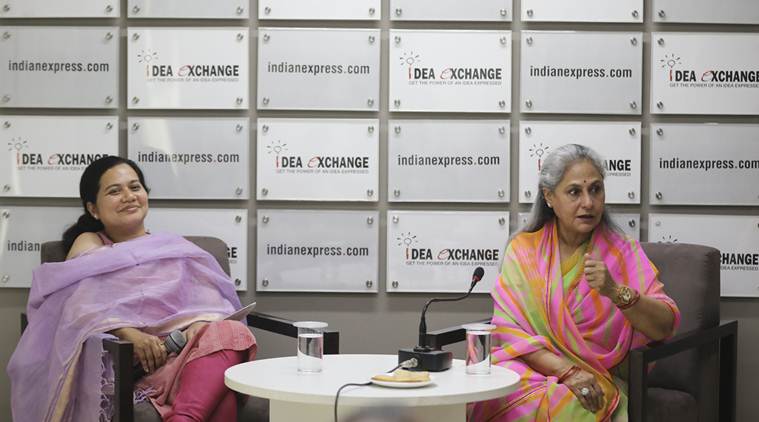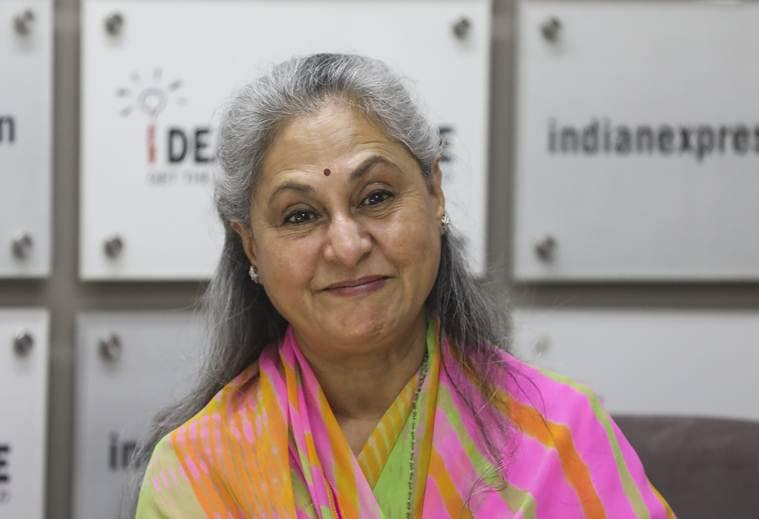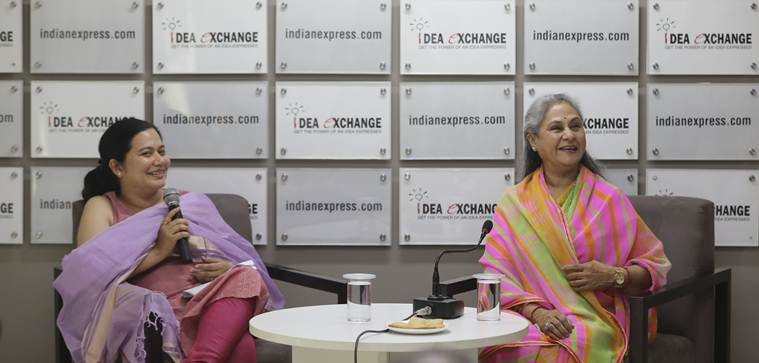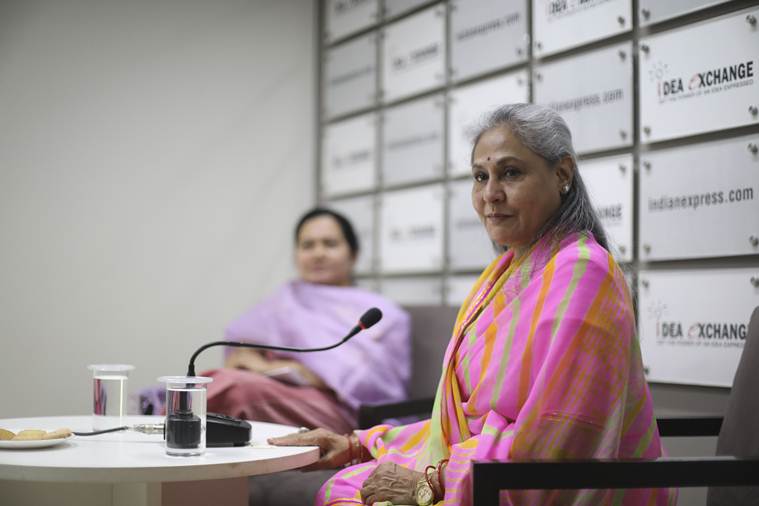 Jaya Bachchan in conversation with National Features Editor Devyani Onial in the The Indian Express newsroom. (Express photo by Abhinav Saha)
Jaya Bachchan in conversation with National Features Editor Devyani Onial in the The Indian Express newsroom. (Express photo by Abhinav Saha)
Rajya Sabha MP and actor Jaya Bachchan talks about her political career and lack of good debates in Parliament, explains why Amitabh Bachchan quit politics, calls for more women writers, says freedom of expression not under threat but denounces Padmaavat row, and says a children’s film society is pointless.
Why Jaya Bachchan?
A Rajya Sabha MP from the Samajwadi Party, Jaya Bachchan has been a parliamentarian since 2004. Known for her natural, spontaneous acting style, she has essayed several notable characters in films such as Guddi (1971), Parichay (1972), Koshish (1972) and Abhimaan (1973). After taking a break for nearly 18 years, Bachchan returned to screen in the late ’90s with a powerful performance in Govind Nihalani’s Hazaar Chaurasi Ki Maa (1998) and was later seen in Karan Johar’s Kabhi Khushi Kabhie Gham (2001) and Kal Ho Na Ho (2003). She was recently re-elected to the Rajya Sabha for a fourth term.
DEVYANI ONIAL: You straddle two very different worlds — the world of cinema in Mumbai and the political world in Delhi. How far removed are the two worlds, and the two cities, from each other and which do you find more difficult to navigate?
My father was a political reporter and I have been surrounded by news while growing up. I have been aware of things, concerned about things. So, for me, it is not politics, it’s normal life. When you have grown up in a certain environment, you are aware of things. I was probably a little more aware being the daughter of a journalist. My father would make us read the papers and discuss the news with us. For me, it was not politics; it was just about being aware of the country one was living in and its requirements, the growth of the country and its people.
I was with my husband when he fought the election in 1984-85 from Allahabad and did door-to-door campaigning. I don’t think many people did that at the time. I was very well guided. It all went off very well. Once he became an MP, I looked after his office and knew many of the people in his constituency personally. It came to me very naturally. Then he resigned and we went away. My life has been a yo-yo between the film industry and the political world.
Then, I got the opportunity to get into the Rajya Sabha and it was very kind of Mulayam Singh to give me the opportunity. It was Amar Singh who introduced me to the Samajwadi Party. He thought I would be a good person to be in this party.
COOMI KAPOOR: What do you think was the reason for Amitabh Bachchan to leave politics so soon while you have been such a success, despite many people trying to put you down — with the office of profit case (in March 2006, she was disqualified from the Rajya Sabha for holding an office of profit as chairperson of the Uttar Pradesh Film Development Council) and other issues?
When people try and put me down, I know how to emerge and fight back. I am a woman, I know how to survive.
COOMI KAPOOR: Even recently, when you got the Rajya Sabha ticket, SP leader Naresh Agarwal, who didn’t get the ticket and went on to join the BJP, was a little cheesed off.
He was more than cheesed off. When Amitji joined the Congress, it was an emotional decision. I suppose all artistes are sensitive. Soon after getting into it, he was not happy and wanted to leave. He said, ‘I can’t do this. It’s not my style. I can’t live like this, I can’t speak like this.’ He was never comfortable. He is a very private person and when you are in two professions that are public — cinema and politics — your life becomes exposed. He couldn’t handle it. And then he couldn’t handle all that goes on in the backdrop. I think he felt vulnerable and he decided that he couldn’t do it any further.
(On the 2006 office of profit case) Of course, I had faced political criticism before, but earlier I didn’t have to handle it personally. This, I did. I must say that I got support from a lot of people, primarily from Amar Singh, who stood by me and said, ‘Don’t worry. We’ll take care.’ And it just worked out. I stuck on and within a month I was back in Parliament. Maybe, I now have a thicker skin.
DEVYANI ONIAL: You are an alumnus of the Film and Television Institute of India and have often spoken very fondly about your days there. What was your response to the controversy over its chairman in 2015?
It is one organisation that I am completely dedicated to and I feel very strongly about it. I wish I could do a lot more for the institute.
 A Rajya Sabha MP from the Samajwadi Party, Jaya Bachchan has been a parliamentarian since 2004. (Express photo by Abhinav Saha)
A Rajya Sabha MP from the Samajwadi Party, Jaya Bachchan has been a parliamentarian since 2004. (Express photo by Abhinav Saha)
The first shot of Guddi was at FTII. It was a request I made to Hrishikesh Mukherjee. I have very fond memories of my days at the institute, those were some of the best days of my life. What I have gained from the institute, especially my professors there, Roshan Taneja and others… I will be indebted to them till the day I die. I got everything from there. I grew as a human being and the training was just fabulous.
(At the time of the controversy) I did speak to the people concerned but obviously they weren’t as concerned. Like the students, I was also very upset about certain things. I felt that what was being done to the institute was very wrong.
LALMANI VERMA: What inspires you to continue in politics?
To see a better future for the younger generation. They need a better life, a better country and better support. We got it when we were young and somewhere along the way I thought it went missing. If the people who have managed to achieve a lot in their profession, if they can come and contribute, it will be of great help. Things must change. The country must go into the hands of younger people because their vision is very different. They are thinking more internationally, more progressively and I support that whole-heartedly. That’s what I want to see, that’s what I support and that’s what I want to see my country become.
LALMANI VERMA: In terms of leadership, how different is SP president Akhilesh Yadav from his father Mulayam Singh Yadav?
Mulayam Singh is the founder of the party and his vision was very different. I think Akhilesh has taken on from there and he’s a very progressive boy. He’s young, his thinking is different. But he has not lost the old traditional values of his father. He’s very humble, always smiling, you never see anything bothering him even at the worst of times. That’s a quality Mulayam Singh has as well.
Akhilesh has managed to do the impossible. Today, for him to win Phulpur and Gorakhpur (Lok Sabha bypolls) — it’s quite a statement. Mulayam Singh is a very large-hearted, generous, benevolent man and Akhilesh is much like him. He’s handling it in a younger way and he has 100 per cent support. I have a huge soft corner for this boy. I see our future in him and that’s another inspiration. There isn’t much difference between the two because, as they say, the fruit doesn’t fall too far from the tree.
SHAILAJA BAJPAI: How has the conduct in Parliament changed over the years? Is it for the better or worse?
I wouldn’t say better or worse… I miss the good debates and discussions in the Upper House. It is the House of Elders, where we should have mature discussions. I find less of that happening.
AAKASH JOSHI: There is now talk about gender parity in the film industry and actresses such as Kangana Ranaut and Anushka Sharma have spoken about it. Do you think things are changing at all?
I’m the wrong person to ask. When I came in, I worked on my terms and wherever I felt that the female lead was not getting enough importance in the script, I didn’t do it. I didn’t mind playing second fiddle to a male character if there was a justification for it. I think the only compromise I made was Zanjeer. I think it’s easy to complain but better to fight it.
DEVYANI ONIAL: What about roles being written for women after a certain age. Is there a change there?
They should write roles for mature, older people… But it’s not the case only in India, it’s everywhere in the world. You see any film industry in the West, it’s the same. There are very few subjects that are based on old people and if they are, they are either in an old people’s home or they’re mentally deranged or senile. Not many interesting roles are written. I think women should write more and maybe then things will change.
ANKITA DWIVEDI JOHRI: Kangana Ranaut’s comments on nepotism, on the Koffee With Karan show, started a debate in the film industry. What is your position on it?
The grass is always greener on the other side. We came from a non-film background and I didn’t have to struggle. I was lucky. My husband had to struggle and my son is still struggling. The first film, maybe, you can get because you are from the film industry, but we never produced any film for our son. There are lots of sons of lots of film people who are still waiting. So, it’s not true.
DAMINI RALLEIGH: In the wake of the #MeToo and TimesUp movements, do you find the silence of the Hindi film industry disconcerting?
I don’t know. I didn’t face any of the #MeToo incidents in my life. I’ve heard about the casting couch. They say it’s there but I don’t know. I’ve never seen it. Maybe I worked in units that never indulged in such activities. I haven’t seen it and I’m not aware of it.
SUANSHU KHURANA: Can you tell us what it was to work with Satyajit Ray in Mahanagar when you were13?
I didn’t want to do the film. I was in a convent school and the film was offered to me. I was 13, Satyajit Ray made sense to you after the age of 15-16. I knew of him and had seen Pather Panchali. I was not very keen and was very scared that the nuns would be angry with me for acting in a film. My father said to me, ‘When opportunity knocks, open the door because you might never get it again. And if you don’t, you’re a loser. If you refuse this offer, you will carry on making such mistakes in life.’ I loved my father. I obeyed him. And I thoroughly enjoyed it.
 Jaya Bachchan has essayed several notable characters in films such as Guddi (1971), Parichay (1972), Koshish (1972) and Abhimaan (1973). (Express photo by Abhinav Saha)
Jaya Bachchan has essayed several notable characters in films such as Guddi (1971), Parichay (1972), Koshish (1972) and Abhimaan (1973). (Express photo by Abhinav Saha)
I was a child. I was running around the studio like a kid. I would see what (Ray) was doing with the other artistes, how he was grooming them. For me, it was just so easy and so nice. I loved it.
DEVYANI ONIAL: You were the chairperson of the Children’s Film Society. What is the future of children’s films in India?
There is a future for children’s films in India but they don’t need a children’s film society. I have been saying this to the government for the past 14-15 years. Either you put in enough money to compete with what the kids are now exposed to through television, mobiles, play-stations, or don’t have an organisation. If there is an independent filmmaker who wants to do something for children, get it properly vetted and finance that, but don’t have this Children’s Film Society because nobody gets to see it and we don’t even know what is going on.
MIMANSA SHEKHAR: You produced the popular sitcom Dekh Bhai Dekh. Do you intend to produce any other such shows?
Creative things can’t be repeated. It happened at that time. Maybe people like to watch the kind of shows being made today. If you don’t watch it, people won’t make it. They are getting TRPs. I really don’t watch television, so I can’t comment much on it. They are really regressive.
DEVYANI ONIAL: Are there any directors whose films you watch now? What kind of films do you watch?
The last film I watched was Sonu Ke Titu Ki Sweety. It was a bit strange in the beginning but later it was quite sweet, and very modern. It was nice. I loved Masaan. I like films which are a little different and don’t cater to the masses only.
DEVYANI ONIAL: Any actors you enjoy watching now?
I think they are all okay. There is a big joke in the industry. When a new actor is brought in, the producer and director ask, ‘So what all does your son do?’ He says, ‘He is very good at horse-riding, dancing, fighting… look at his body.’ The director asks, ‘What about acting?’, to which he says, ‘Oh, he will do that.’ So the acting happens between these activities.
SHAILAJA BAJPAI: Do you think we need a censor board?
I am totally against censors. I think you have to leave it to creative minds to decide if they should be making films which need to be watched by a certain age group. You have parental guidance, adult categories, whatever. I think you should leave it at that. If the film is really bad and objectionable, people will not see it. You cannot today sit down and judge what people should see and what people should not see. What is right and wrong. I have always been against censorship.
COOMI KAPOOR: I believe Mamata Banerjee was very keen that you be nominated to the Rajya Sabha from her party but Akhilesh Yadav asked her not to do it.
It was not like that. She is a close friend. I knew that if I did not get nominated by the Samajwadi Party, she would have offered (to nominate me). I did not want to leave the SP. Not that she officially asked me. Mazak mein baat kari (She joked), but nothing serious.
PALLAVI CHATTOPADHYAY: Do you think freedom of expression and artistic freedom are under threat now, as was seen during the release of Padmaavat?
This is a tricky question. No, I don’t think it is under threat. I don’t know who helped whom. The film made a lot of money. I haven’t seen it, I haven’t had the time. I love Sanjay Leela Bhansali’s work. I think he has got a fantastic aesthetic sense. I did raise a little voice when he was attacked the first time. You cannot attack someone creating something. I did speak about it in Parliament.
 Jaya Bachchan was recently re-elected to the Rajya Sabha for a fourth term. (Express photo by Abhinav Saha)
Jaya Bachchan was recently re-elected to the Rajya Sabha for a fourth term. (Express photo by Abhinav Saha)
SHAILAJA BAJPAI: What is it like to be a woman in the Rajya Sabha?
After 12 years of being so diligent, so active, I am still known as a film actor who is in Parliament, which is very unfair. I am very proud to be an actor, a person from the film industry, but I am not representing the film industry, I am representing the Samajwadi Party, and it upsets me if I am not given that recognition. Recently, a very senior minister said that other film actors don’t attend Parliament but she does. It is a very condescending attitude. I don’t want that comparison because I am here representing a party. Hema Malini is representing a party, she is very regular, she comes to the Lok Sabha. Kirron Kher is very regular and active. There are so many people from the South Indian film industry who are in Parliament… Why do you not say anything about them?
DEVYANI ONIAL: You are a family of actors, do you talk shop at home?
Of course we do. It is always Abhishek who says you have to see this, it is fantastic. My husband only watches sports. That is very boring for me. I have a different place for watching television. The father and son watch together.
SHAILAJA BAJPAI: Does Aishwarya miss being a full-time actress?
I don’t think so. She is an obsessive mother. She doesn’t leave that child alone for a second. She wants to do everything. She works whenever she can. This whole generation of young mothers are obsessive. I was always there but I was not like them. They want to bathe the child, feed the child, read to the child. I have done it but in moderation. I have seen my daughter do the same. We have grown up falling, no one ever bothered.
Times change, things change. There are more insecurities. We all led a very protected life because we lived in joint families, there was always somebody around. Now Aishwarya doesn’t have much choice. I am here, her mother is not there all the time. Today you don’t have a joint family, so the mother has to take all the responsibility.